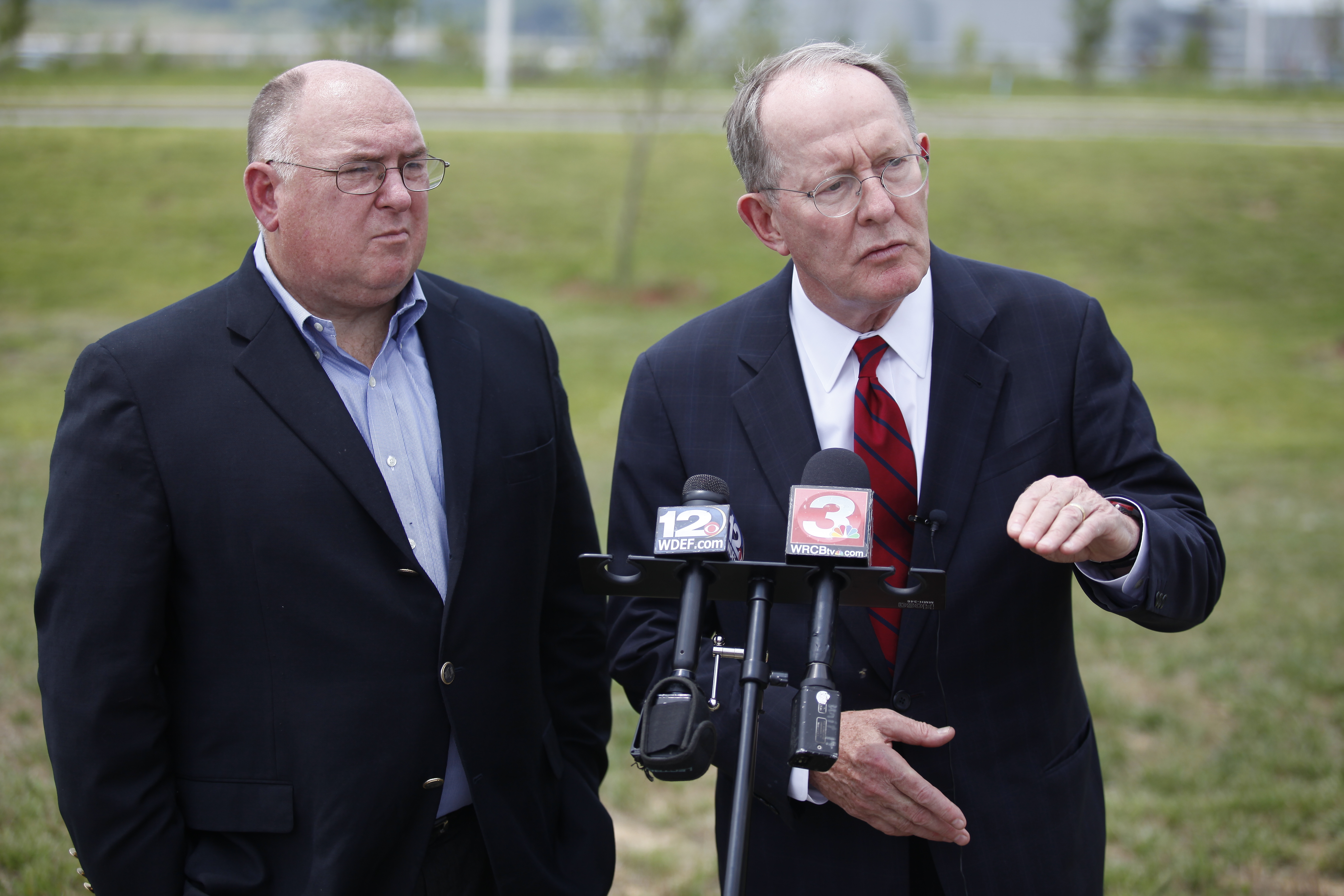 Wayne Cropp, former director of the Chattanooga Hamilton County Air Pollution Control Bureau, left, stands with U.S. Sen. Lamar Alexander, R-Tenn., during a news conference near the Volkswagen plant in Chattanooga on Friday. Alexander announced his support for the utility MACT rule which will require upgrades of pollution controls at coal plants.
Wayne Cropp, former director of the Chattanooga Hamilton County Air Pollution Control Bureau, left, stands with U.S. Sen. Lamar Alexander, R-Tenn., during a news conference near the Volkswagen plant in Chattanooga on Friday. Alexander announced his support for the utility MACT rule which will require upgrades of pollution controls at coal plants.U.S. Sen. Lamar Alexander, R-Tenn., who stepped down as head of the Senate Republican Caucus last year, is breaking ranks with his GOP colleagues to support an Obama administration plan to impose stricter pollution controls on coal-fired power plants.
Despite a $400,000 television campaign urging him to fight the new rules, Alexander said Friday that the new EPA-ordered pollution controls on coal plants should help the economy and the environment of Tennessee. Alexander is the only Republican in the U.S. Senate so far to indicate he will oppose a measure to be voted on next Wednesday to overturn the EPA requirements for utilities to use maximum achievable control technologies (MACT) to limit pollution from coal plants.
"East Tennesseans know that we have a clean air problem," Alexander said during a visit Friday to Knoxville, Athens and Chattanooga. "Knoxville has been the worst city in the country for asthma three times in the past eight years. Chattanooga is fifth. The Great Smokies is one of the most polluted national parks in the country."
Standing in front of Volkswagen's $1 billion auto assembly plant in Chattanooga later Friday, Alexander said VW and other automotive manufacturers wouldn't be in Tennessee if the state had not taken steps to clean up the smog and toxic substances in the air.
"Every metropolitan area in Tennessee is struggling today to stay within the air quality standards that affect whether new industries are able to locate in those areas," he said.
As governor in 1980, Alexander said Nissan would have bypassed Smyrna, Tenn., and located instead in Cartersville, Ga., had the auto maker been unable to get a air permit for its auto plant.
Chattanooga's top air quality official said without better air in Chattanooga "the site of the new Volkswagen plant behind us would be a vacant lot." Bob Colby, director of the Chattanooga-Hamilton County Air Pollution Control Bureau, said Chattanooga moved from having the nation's dirtiest air in 1969 to meeting stricter federal air quality rules. Colby said the air was cleaned up through such measures as vehicle inspections, summertime burning bans and industrial waste limits.
But Chattanooga still suffers from pollution from older coal power plants and other pollutants which blow into the area.
The Tennessee Valley Authority reached an agreement with EPA last year to phase out its oldest coal units and install scrubbers and selective catalytic reduction (SCR) devices on its remaining coal-fired units.
"The only fair thing to do is that if we are required to do it, then our neighbors should be required to do it, too," Colby said.
Colby was joined Friday by his predecessor, J. Wayne Cropp, a Republican and local attorney, in supporting the measure.
But most Republicans in the Senate and coal industry groups are opposing the new EPA rules. AmericanCommitment, a newly formed political action committee which is fighting the EPA rules, is spending $400,000 on television ads asking why Alexander is supporting "Obama's war on coal" which the group claims will boost power rates and cut jobs.
Phil Kerpen, president of AmericanCommitment, said studies indicate electricity prices in Tennessee will rise by more than 13 percent and at least two coal units will shut down if the new EPA rules are implemented.
Alexander said EPA estimates the nationwide impact from the new rules is more likely to boost electricity rates by 3 percent and would be offset by better health and more jobs stimulated from pollution controls and energy alternatives to coal.
Only 546 Tennesseans still work in coal mines, Alexander said.
"There are also 1,200 Tennesseans who work at the Alstom plants in Knoxville and Chattanooga that will supply the country with pollution control equipment required by this rule," he said.

